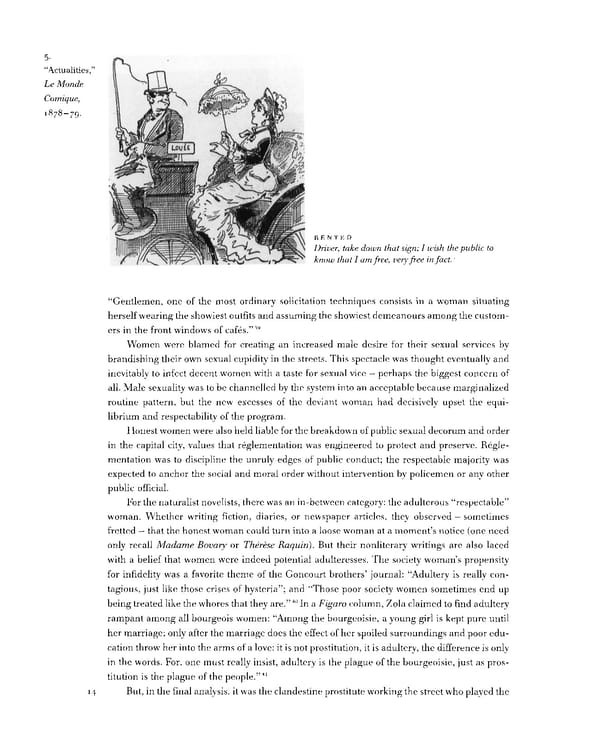5- "Actualities," Le Monde Comique, 1878-79. RENTED Driver, take down that sign; I wish the public to know that I am free, very free in fact ''Gentlemen, one of the most ordinary solicitation techniques consists in a woman situating herself wearing the showiest outfits and assuming the showiest demeanours among the custom- 39 ers in the front windows of cafes." Women were blamed for creating an increased male desire for their sexual services by brandishing their own sexual cupidity in the streets. This spectacle was thought eventually and inevitably to infect decent women with a taste for sexual vice — perhaps the biggest concern of all. Male sexuality was to be channelled by the system into an acceptable because marginalized routine pattern, but the new excesses of the deviant woman had decisively upset the equi- librium and respectability of the program. Honest women were also held liable for the breakdown of public sexual decorum and order in the capital city, values that reglementation was engineered to protect and preserve. Regie- mentation was to discipline the unruly edges of public conduct; the respectable majority was expected to anchor the social and moral order without intervention by policemen or any other public official. For the naturalist novelists, there was an in-between category: the adulterous "respectable" woman. Whether writing fiction, diaries, or newspaper articles, they observed — sometimes fretted — that the honest woman could turn into a loose woman at a moment's notice (one need only recall Madame Bovary or Therese Raquiri). But their nonliterary writings are also laced with a belief that women were indeed potential adulteresses. The society woman's propensity for infidelity was a favorite theme of the Goncourt brothers' journal: "Adultery is really con- tagious, just like those crises of hysteria"; and "Those poor society women sometimes end up 40 being treated like the whores that they are." In a Figaro column, Zola claimed to find adultery rampant among all bourgeois women: "Among the bourgeoisie, a young girl is kept pure until her marriage; only after the marriage does the effect of her spoiled surroundings and poor edu- cation throw her into the arms of a love: it is not prostitution, it is adultery, the difference is only in the words. For, one must really insist, adultery is the plague of the bourgeoisie, just as pros- titution is the plague of the people."41 H But, in the final analysis, it was the clandestine prostitute working the street who played the
 Prostitution & Impressionists Page 34 Page 36
Prostitution & Impressionists Page 34 Page 36